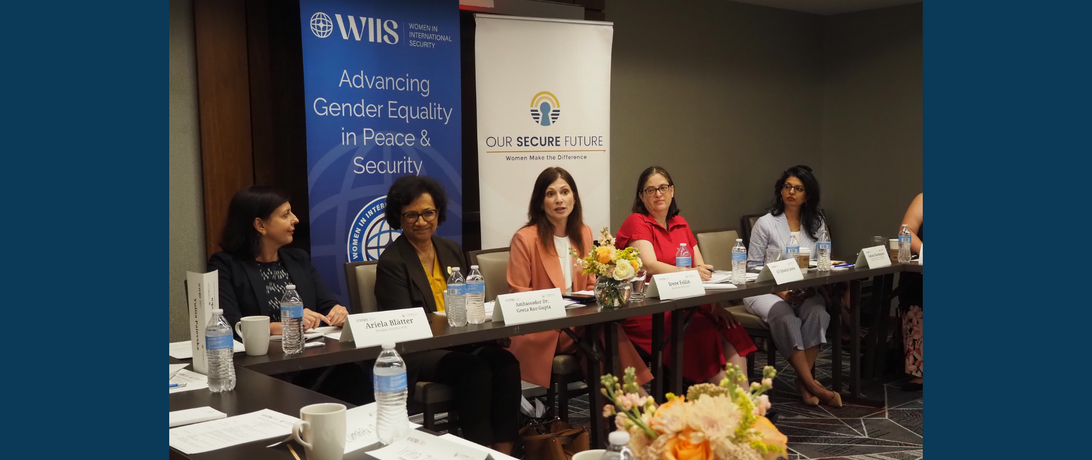
On July 10, 2024, Our Secure Future (OSF) and Women In International Security (WIIS), co-hosted a private breakfast event discussing the Women, Peace and Security agenda in today's security framework.
The event, titled “Beyond Representation: Women’s Leadership,” examined women's role in an evolving security environment. The rules-based international order has been challenged by conflicts around the world, threatening civilian populations and amplifying global insecurity. The event discussion highlighted the importance of women's leadership in NATO and discussed government representatives' outstanding contributions to Women, Peace and Security (WPS) initiatives.
The WPS framework promotes two significant advancements: the advancement of women in defense strategy and the inclusion of a gender perspective in security plans and measures. By creating more opportunities for women to take on leadership roles within defense, these changes ensure that diverse voices and experiences shape strategic decisions. Additionally, incorporating a gender perspective into security strategies allows for a more comprehensive understanding of how security issues uniquely impact different genders, leading to more effective and equitable solutions.
The event’s discussion featured the following distinguished speaker lineup followed by a broader conversation with the participants:
- Assistant Secretary Jessica Lewis, Assistant Secretary of State for Political-Military Affairs, U.S. Department of State
- Ambassador Dr. Geeta Rao Gupta, Ambassador-at-Large for Global Women’s Issues, U.S. Department of State
- Irene Fellin, NATO Secretary General’s Special Representative for Women, Peace and Security
Opening remarks by Ariela Blatter, WIIS President and CEO, set the stage for the conversation, emphasizing NATO's 75th anniversary and the need to promote gender equality and diverse perspectives in security strategies. Further, WIIS’ research and the 1325 Scorecard gender assessment tool have led to measurable and actionable steps in NATO's WPS agenda.
OSF Vice President Sahana Dharmapuri also highlighted OSF's efforts to incorporate WPS into all policymaking, including working to mainstream gender perspectives into security policy. Through its gender policy research and trainings, as well as establishing the first bipartisan U.S. WPS Congressional Caucus, OSF continues to support the advancement of the WPS agenda.
As part of the event, the keynote speakers discussed NATO's role in advancing a gender lens in global security policy. The role of NATO leaders includes consultations with ministers on a variety of security matters, such as cyber security and arms transfers. Weapon removal and de-mining efforts were also discussed, illustrating how security issues can offer women income opportunities and pathways to help survivors advocate for and shape policies.
It was also noted how important it is to work with NATO allies on issues related to WPS, especially on cybersecurity and emerging threats related to gender-based violence (GBV), and particularly technology-facilitated GBV (TFGBV). Currently, the world is experiencing more conflicts and crises than at any time since World War II, which is putting an adverse strain on international security. Governments must do more internationally, especially when it comes to participating in WPS initiatives. Women's participation in the security field has plateaued after decades of growth, and partnering with women-led civil society organizations is an effective way to continue to grow women's participation.
Recognizing the role of the WPS agenda at the NATO Summit, the speakers called for more partnerships between women-led civil society organizations and government officials, asserting that mentorship is crucial to learning and forming better policies. It was noted that gathering women leaders across the security field is a privilege, but it should not have to be. Men policy makers need to care about gendered issues and gender-responsive leadership and women need to ensure leadership is accountable.
As the conversation opened to Q&A, other participants discussed how they became aware of the WPS agenda and the importance of being supported by women and opening doors for others. Participants reflected on the suffering of Ukrainian women during the war, highlighting the importance of qualitative participation of women in security policy. Apart from the number of women who are taking on leadership roles, a qualitative approach is necessary to understand the meaning and outcomes of women's participation in peace and security decision-making processes.
Participants also stressed that governments should use a gender lens in all policies and programming, as they see how much difference this approach could create. Concrete examples were shared on how women have established peace in their own communities, such as facilitating networks between women’s civil society members in Papua New Guinea to support the country’s peace-building operations.
In addition, other speakers contributing to the discussion spoke about the importance of integrating more examples of WPS successes, enhancing women's visibility in security, allocating budgets for WPS policy matters, and having stand-alone gender representatives. Participants reflected on their own country’s specific WPS and gender policies, as well as future goals for their WPS initiatives.
As the global landscape evolves, women play an increasingly crucial role in shaping peace and security agendas. Within NATO and beyond, the participants called for revising policies, amplifying women's voices, and fostering inclusive decision-making processes. With NATO celebrating its 75th anniversary, it is essential to consider these insights and commit to recognizing, valuing, and nurturing women's contributions to our collective security.
